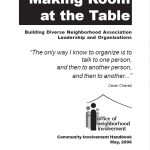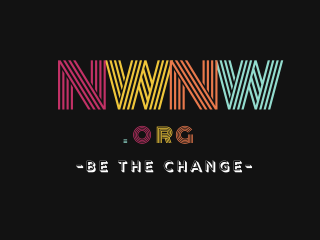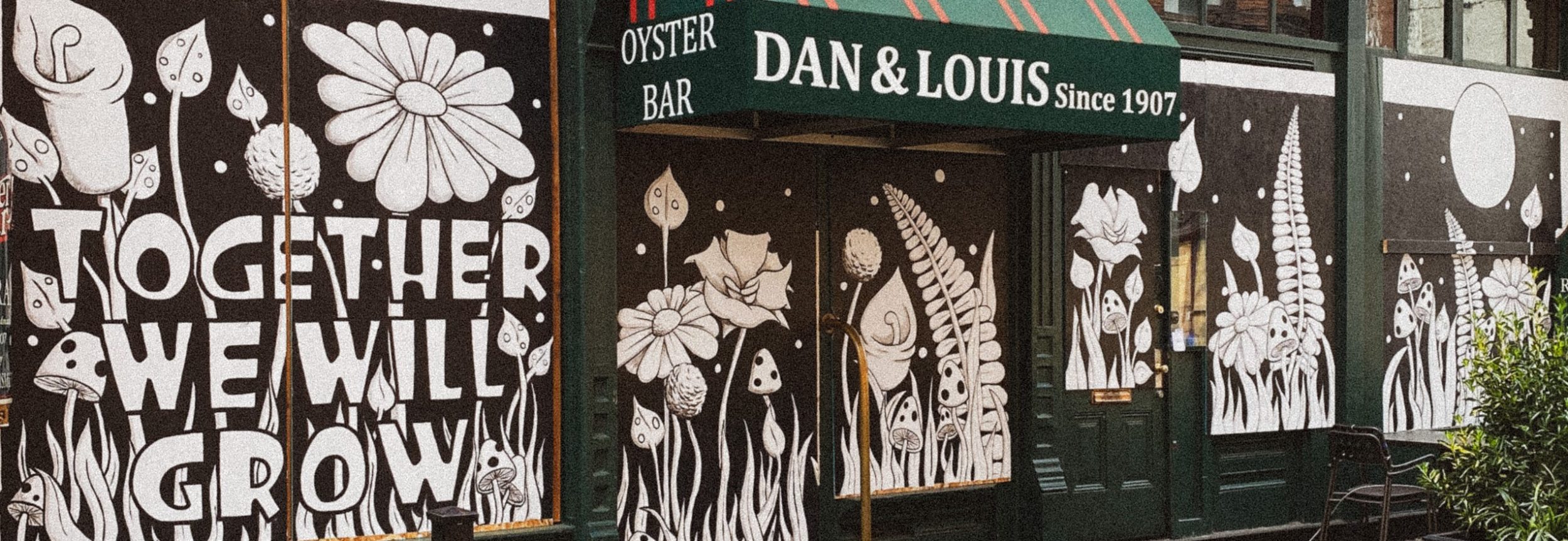Neighbors West-Northwest, updated March 2020
Neighborhood associations provide an opportunity for neighbors to work together on issues of common concern. Building a broad and diverse base of residents and business owners in your neighborhood can make a compelling case you have a mandate for change. City officials will be more likely to pay close attention to your agenda if you represent Portlanders from a range of backgrounds.
Although many associations have the desire to engage with diverse populations, the common, often daunting question is: “How do I start?”
This booklet offers some guidance, including first steps and tailored suggestions for Northwest neighborhoods. The information and much of the language was abridged from the Office of Neighborhood Involvement’s “Making Room at the Table,” (May 2006) combined with the experiences of Neighbors West-Northwest staff.
SO, HOW DO I START?
The first step is to identify why you want to engage with diverse community members. Of course, it’s the right thing to do, but your organization will have more focus and success if you clearly identify your motivations.
Some examples:
- We want our meetings to feel welcoming to everyone so we can hear different perspectives and better represent our neighborhood.
- We want to find areas of common ground with different groups so we can more effectively advocate on issues together.
- Our board is mostly homeowners, we want to learn about the issues renters care about.
Put it on the agenda
Set aside part of or an entire board meeting to discuss your neighborhood association’s engagement goals. Use the following discussion points:
- Who is currently at the table? Who is missing?
- Who finds it easy to come to and participate in our meetings? What might make it challenging for others?
- What’s our motivation? How much effort are we willing to put into this?
- What are our priorities?
- What are two realistic actions we can work on now?
Do your homework
Ask NWNW staff for help—we want to see you succeed! We can point you to relevant trainings and materials to prepare you for positive partnership-building. We can also point you to resources that identify demographics and organizations within your neighborhood.
Building relationships and creating change take time. It requires a sincere commitment from volunteers who recognize the importance of lifting everyone’s voice.
IT’S UP TO YOU
As mentioned, change doesn’t just happen, and it’s up to you to develop and maintain strategies for reaching new people. It’s not enough to call up a leader of an organization—you need to demonstrate your ongoing commitment to each potential partner.

Tips:
- Frequent other community events and public meetings. Plan for your organization to have a presence.
- Identify how you can be of assistance to other organizations. Help link them to resources you know about.
- You need to make a compelling case for why an individual or organization should engage with you. Take on new issues identified by people of color, youth and renters. Mobilize your neighborhood to work on their community projects.
- Be on the lookout for suggestions from people you meet with and new ally organizations that you can act on easily and quickly. This will show that their recommendations are taken seriously.
Important: Don’t expect people to explain to you what you’re doing wrong or offensively. Take responsibility for yourself and learn about how you may be excluding or hurting others by reading articles or talking to coalition staff. It’s nobody else’s job to make your organization more welcoming.
CRAFTING INCLUSIVE MEETINGS
Rigid meeting structures can deter people from participating—nobody wants to feel like they don’t know the rules or can’t ask questions. Meetings need to be welcoming and accessible to all, every time. For example, even if you’ve never seen a person using a wheelchair at your meetings, the space still needs to be wheelchair accessible.
Ideas for creating a more welcoming atmosphere:
- Lead go-around introductions for all attendees.
- Go over the agenda and explain how the meeting will run.

- Ask questions to check in and ensure everyone understands the process and agenda items.
- Bring snacks.
- Create multiple ways
for people to express themselves. Some people tend not to want to share in a
larger group setting.
- Allow for one-on-one discussions in pairs.
- Allow written comments on note cards.
- Break up into small groups that report back to larger group.
- Consider changes to your meeting time and physical location if they are barriers to participation by individuals or groups you are attempting to accommodate.
- Hold meetings specifically dedicated to hearing from the community. Share flyers with faith institutions, schools, social service providers and local businesses.
RESOURCES
Making
Room at the Table
nwnw.org/civic-engagement-in-portland/

The full guide includes advice for engaging specific minority communities, interrupting prejudiced comments and much more. It’s worth your time!
Neighborhood demographics
- 2010 Census data by neighborhood: www.portlandoregon.gov/civic/56897
- Languages spoken by neighborhood, and other information: multco.us/global/demographics
Immigrant and Refugee Community Organization (IRCO) irco.org/ilb/
- Language bank: Fee for translation and interpretation
- Diversity trainings for organizations
Constructing Civic Dialogues Trainings: www.portlandoregon.gov/civic/60549
Your coalition, Neighbors West-Northwest!
- Call us at 503.823.4288
- Email coalition@nwnw.org
- Stop by our office at 2257 NW Raleigh St.
NW PARTNERSHIP IDEAS
Portland United Against Hate
A city-funded organization that provides trainings, education and reporting about hateful targeting and violence throughout Portland. www.portlandunitedagainsthate.org/
Ideas for engagement:
- Attend PUAH’s quarterly gatherings, which they post on their Facebook page: www.facebook.com/PortlandUnitedAgainstHate/
- Endorse or become a member of PUAH: www.portlandoregon.gov/civic/article/707286
- Attend a Constructing Civic Dialogues training: www.portlandoregon.gov/civic/60549
Tenants Rights’ Organizations
Consider reaching out to organizations such as Portland Tenants United or Community Alliance of Tenants to organize a renters’ rights workshop or guest speaker at a meeting.
General tips for reaching renters:
- Organize a door-to-door neighborhood canvass. Distribute newsletters, invitation fliers to meetings or events, or surveys to select areas with high renter occupancy.
- Target one apartment complex for outreach at a time. Build a relationship with one lead tenant who expresses interest. Organize a potluck with them on site to talk about issues with their neighbors.
- Post notices at local groceries and convenience stores, child-care centers, school and church bulletins.
Social Service Providers
As you know, there are myriad social service providers in the downtown area who serve vulnerable Portlanders from around the Northwest. Unhoused people have unique and important perspectives to share about livability, resources and safety in your neighborhood.
Connecting with a social service provider is a good first step. Contact NWNW for information on providers in your area.
Ideas for engagement:
- Co-organize a clothing drive or swap using community collections and clean up funds offered by NWNW.
- Contact other neighborhood associations with strong ties to providers, such as Old Town, to learn how your organization can lend support.
Portland Clean Air
Coalition of neighborhood associations using grassroots activism to apply pressure to Portland’s largest polluters. Neighborhoods write letters and meet with polluters to advocate for clean air. Diesel pollution heavily affects the Portland region. portlandcleanair.org/
Congregation Beth Israel
Jewish temple and school in NW Portland that hosts lectures and community events. CBI has several committees, including a social action committee, with meetings open for public observation.
www.bethisrael-pdx.org/community/
Diversity and Civic Leadership (DCL) Organizations
DCLs receive funding from the city to build capacity and encourage civic participation in minority communities. Look at what initiatives they support and what they’re working on. Many DCLs are very large organizations, so contact NWNW staff to help facilitate a relationship.
The organizations are:
Promotes the integration of refugees, immigrants and the community at large into a self-sufficient, healthy, and inclusive multiethnic society.
Provides services and advocacy for the education, leadership and civic engagement of Latino youth, families and communities.
NAYA brings together voices from numerous Native American tribes to provide culturally specific programs and services.
Led by people of color, immigrants and refugees, rural communities, and people experiencing poverty, we work across Oregon to build a unified intercultural movement for justice.
Programs include a blend of direct services, organizing, outreach and advocacy for African Americans to achieve equality.

